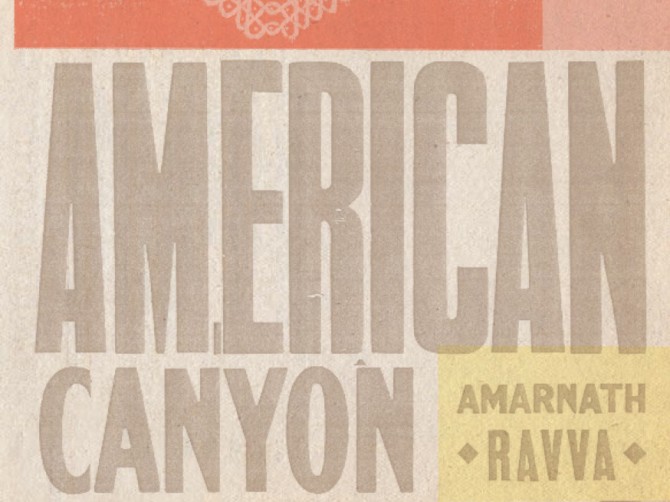The following is an excerpt from the beginning of Amarnath Ravva’s American Canyon, which will be published by Kaya this spring.
JULY 23, 2003. 6:32 AM > 00:00:00:00
Ravi yells, don’t go too far into the water—it’s deep and the stones are slippery! At the top of the steps, he is looking through the viewfinder of the video camera. He works in Pamban at a hydroelectric project and was sent to help me because I don’t know Tamil, the language spoken on this island off the coast; Ravi, who grew up in Andhra Pradesh, knows both Tamil and Telugu. I stop two steps from the edge and place my glasses on a dry patch of stone. The first step is green, from algae, and slides under my foot. I steady myself. The mandapam at the center of the tank bears the eroding couplets of the Thirukkural above the water.
00:03:00:00
The water stains the edge of my towel green. I splash it three times at my face. There is no way I will put my head under this water. There isn’t even a lotus flower in the tank. I know millions of Hindus have done this before me. Here. At this very tank. Their dirt floats before it settles. I turn around to see Ravi approach the water’s edge. He gestures for me to immerse myself. I take another step further down, close my eyes, and dunk my head. I do this three times just because of tradition, and one more time, just in case.
THERE IS A WAY to begin a ritual. You first talk to a guide, who introduces you to a pujari, who then approaches the superintendent of the temple services. We skip these steps because Ravi’s boss knows the superintendent. He says we have to be discreet. Everyone takes their share. Signs, posted on the stone blocks of the passageway inside, are in Tamil and English: “No non-Hindus allowed inside the temple.” They are very strict here in Rameswaram; even Sonia Gandhi had to request permission to enter though she was the wife of the prime minister at the time—born in Italy, she was not Hindu by birth, but had converted. The superintendent, whose office is next door to the temple, assigns me a head priest and takes 10,000 rupees.
At night, I return to the hotel, where my friend from Berkeley, Chris, is recovering from a cold. I tell him about my interaction with the superintendent, and he says, The spectre of your uncle follows us wherever we go in India. My uncle, a financial consultant for power projects, mostly hydroelectric, has a developed network of contacts, which includes Ravi’s boss. In the third bed, next to Chris’, Ravi silently reads the paper. Before I entered his life, Ravi would spend the day at the plant. At home, he would sit down to eat idlis covered in sambar, his son lost in the folds of his wife’s sari. At the hotel, the amount of pickle he uses reflects how much he hates the food.
YESTERDAY I FOUND OUT the exact time I was born and told the pujari. Another pujari, across the bridge in Pamban, produced my birth chart with his computer. They discussed the details. Where the stars shone when I was born. How they rested in the sky. They determined over the phone that there was no reason for me to do the naga prathista, but if I was going to do the ritual, I first had to wash away the misfortune of being born in America with the waters of the Lakshmana Tirtham.


Leave a Comment
We'd love to know what you think.